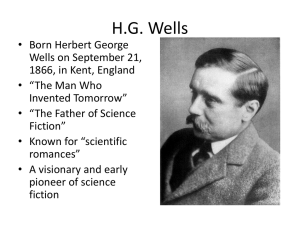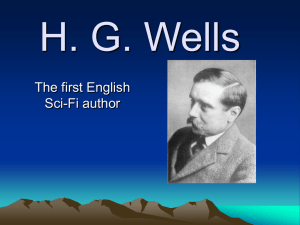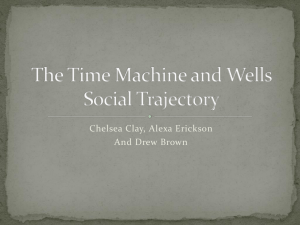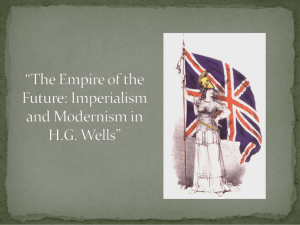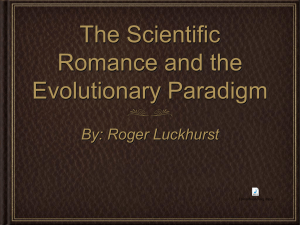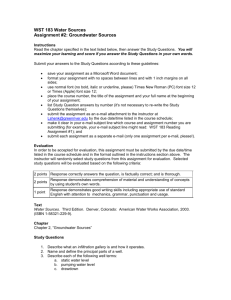VanSickle VanSickle VanSickle Brooke VanSickle Professor
advertisement
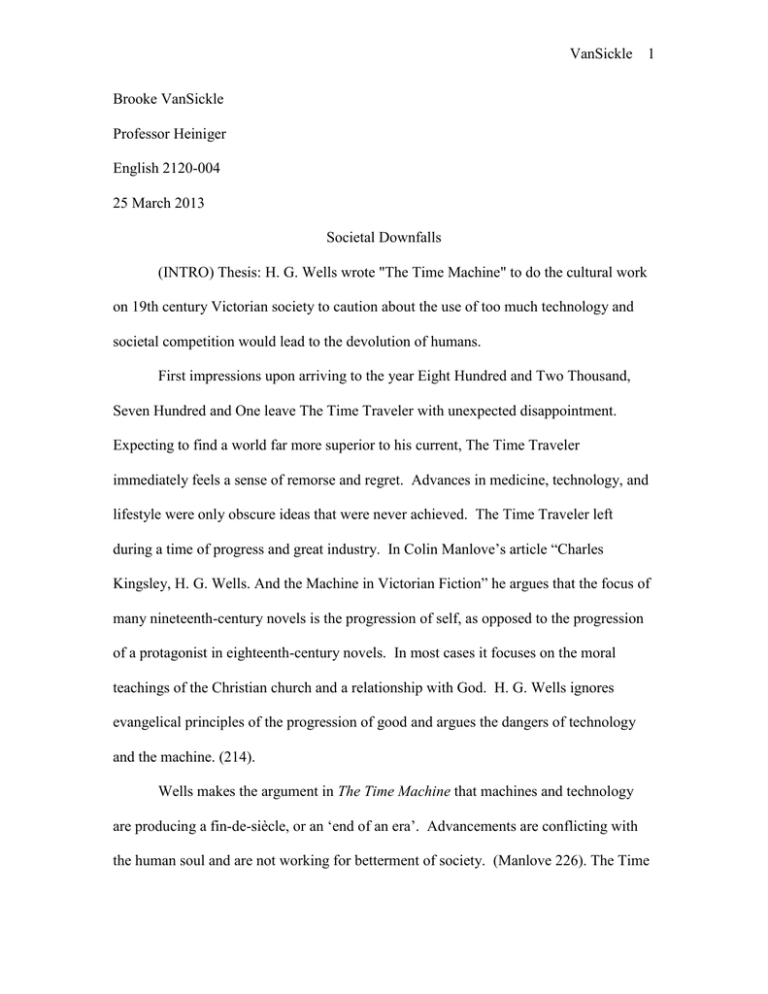
VanSickle 1 Brooke VanSickle Professor Heiniger English 2120-004 25 March 2013 Societal Downfalls (INTRO) Thesis: H. G. Wells wrote "The Time Machine" to do the cultural work on 19th century Victorian society to caution about the use of too much technology and societal competition would lead to the devolution of humans. First impressions upon arriving to the year Eight Hundred and Two Thousand, Seven Hundred and One leave The Time Traveler with unexpected disappointment. Expecting to find a world far more superior to his current, The Time Traveler immediately feels a sense of remorse and regret. Advances in medicine, technology, and lifestyle were only obscure ideas that were never achieved. The Time Traveler left during a time of progress and great industry. In Colin Manlove’s article “Charles Kingsley, H. G. Wells. And the Machine in Victorian Fiction” he argues that the focus of many nineteenth-century novels is the progression of self, as opposed to the progression of a protagonist in eighteenth-century novels. In most cases it focuses on the moral teachings of the Christian church and a relationship with God. H. G. Wells ignores evangelical principles of the progression of good and argues the dangers of technology and the machine. (214). Wells makes the argument in The Time Machine that machines and technology are producing a fin-de-siècle, or an ‘end of an era’. Advancements are conflicting with the human soul and are not working for betterment of society. (Manlove 226). The Time VanSickle 2 Traveler was expecting to find a world of advances on every level. He realized that technology “had increased till Industry had gradually lost its birthright in the sky” (Wells 41). While The Time Machine warns about the harm in technology, it is also a science fiction novel that continues to praise its good it has done for society. Science Fiction novels glorify advancements in modern machine and marvel at all it has achieved. Wells continues this early scientific trend in The Time Machine as well. The advancements of the Victorian area were originally seen has a triumph over nature. Man could now defy nature and its elements. No longer was survival a struggle against the organic world, but a victory over nature. (Manlove 230). The Time Traveler saw a world where pests and disease had been abolished and fruit and flowers had reached an ideal state with no imperfections. The Time Traveler arrives and initially sees a world of Utopia. He sees a world where “there were no signs of struggle, neither social nor economical struggle… It was natural on that golden evening that I should jump at the idea of a social paradise” (Wells 47). Wells uses the initial impressions of his arrival in the year Eight Hundred and Two Thousand, Seven Hundred and One to glorify technology and all it has overcome. While technology has brought about a destruction of many aspects of the human race, and will eventually lead to its death, there was a short time of a perfect utopia. Upon arrival in the year Eight Hundred and Two Thousand, Seven Hundred and One, The Time Traveler is under the impression it is a communistic society. One of his first words even spoken was “communism” (Wells 24). The Time Traveler notes that they were all dressed in the same attire with the same hair. Even the appearances in the VanSickle 3 faces were similar; the genders looking alike as well. Typical gender differentiations had been eliminated, as well as the purpose of family. Initially, The Time Traveler believes that communism is the root to an idealistic social world. The original presentation of the new area is that of peace and security. The Time Traveler eventually discovers while a communistic utopia creates a beautiful work, the society of the Eloi is actually one of a exploited capitalistic society. (Beaumont 236). Somewhere in society, between the era of The Time Traveler and the year Eight Hundred and Two Thousand, Seven Hundred and One, life was at an absolute safety. Matthew Beaumont argues in “Red Sphinx: Mechanics of the Uncanny in “The Time Machine”’ that life had reached a balance between wealth and comfort and there was no unemployment problems. It was “a capitalist utopia, one that accepts a permanent division between the classes even if it homes to make society completely pacific” (Beaumont 241). The one common factor that persists through time though is that “man never changes”. Where there are societal classes, and there will always be conflict. Wells uses The Time Machine as a warning to present day society that as long as there is a distinction among classes of society, there will never be everlasting peace. The balance from a capitalistic society is only temporary. The Morlocks are an example of a mistreated societal class that eventually rose up to a cannibalistic group because of their horrific treatment from the Eloi. Even though technological advancements pointed to a capitalistic society, Wells originally argues that capitalistic society would create an unbalanced world between the Have’s and the Have-not’s. He described the current society in Eight Hundred and Two Thousand, Seven Hundred and One based on two social classes, “above ground you have VanSickle 4 the Haves, pursing pleasure and comfort and beauty, and below ground the Have-nots; the Workers getting continually adapted to the conditions of their labour” (Wells 41). The capitalistic society that the Victorians know has turned into an abuse in power. Those in charge and those with plenty have appeared to exploit to work of those who are below them. Two distinct and separate worlds have been created based on societal roles. Matthew Beaumont’s article “Red Sphinx: Mechanics of the Uncanny in “The Time Machine”” makes the argument that the only way for a capitalist society to cease to exist is the same basic principals that created it. (232). Beaumont’s idea explains why the current relationship between the Eloi and the Morlocks is no longer one of a capitalistic society. There is one distinct ruling class, and one of fear and dependence. Wells explains the situation of the Eloi and Morlocks being one of drastic change. Originally “man had thrust his brother man out of the ease and the sunshine. And now that brother was coming back- changed! Already the Eloi had begun to learn one old lesson anew. They were becoming re-acquainted with Fear” (49). At this point, society has made a complete cycle of reverse. A capitalistic society began to exploit the work of the Have-not’s, creating a false sense of security. Overtime the Have-not’s, or the Morlocks, have slowly begun to rise up and taken advantage of the Eloi getting comfortable in their position. Through the dependence on technology and the superiority over nature, humans began to devolve over the years and into Eight Hundred and Two Thousand, Seven Hundred and One and beyond. By the end of the novel, The Time Traveler makes note of the new society saying “there is no intelligence where there is no change and no need for change. Only those animals partake of intelligence that have to meet a huge variety VanSickle 5 of needs and dangers” (Wells 65). Once there was a balance and no need for change the human race began an overall decline. Without a world of challenges the human race began to get soft, in both appearance and physical adaptations. While the Eloi became comfortable in their world, the Morlocks were eventually able to continue to revolutionize and overturn the Eloi. (Beaumont 243). Robert M. Philmus considers The Time Machine to serve as a warning for the human race in his article “’The Time Machine”: Or, The Fourth Dimension as Prophecy”. Philmus argues that there are two reasons as to why humanity is ultimately doomed to a future of that similar to the Eloi and Morlocks. The first one being a result of human’s ability to overcome nature and the organic world, as well as other humans. The ultimate downfall is due to humanity’s own result. Philmus blames this lack of triumph due to negative moral judgments. Capitalistic society became an opportunity for those with resources to dehumanize those who labor. The upper-world eventually became one of uselessness and beauty and the under-world became one of machinery and brute strength. Society became too specialized and what originally had a purpose became useless. The second reason Philmus considers as a cause of devolution is due to uncontrollable, evolutionary processes. Mankind began to place too much emphasis on technology and be relying on it too much it became their own downfall. There was no longer a need for intelligence and no struggle for survival. (533). By writing a short novel, Wells is able to achieve his main purpose of The Time Machine to warn society. Too much technology, exploitation of others, and triumph over nature all point to one specific purpose Wells had in mind. The Time Machine serves to do the cultural work to warn society to change their current motives and priorities. Wells VanSickle 6 saw a society that needed a science fiction piece of work to show the abuse of society. In Wells opinion, capitalism only worked to serve the Have’s and the Have-not’s were merely used for mechanical work. Triumph over nature only resulted in triumph over fellow man, and as a result, society creates its own downfall. VanSickle 7 Work Cited Beaumont, Matthew. “Red Sphinx: Mechanics of the Uncanny in “The Time Machine”.” Science Fiction Studies 33.2 (2006): 230-250. Web. 25 Feb. 2013. Manlove, Colin. “Charles Kingsley, H. G. Wells, and the Machine in Victorian Fiction.” Nineteenth-Century Literature 48.2 (1993): 212-239. Web. 25 Feb. 2013. Philmus, Robert M. “”The Time Machine”: Or, The Fourth Dimension as Prophecy.” PMLA 84.3 (1969): 530-535. Web. 25 Feb. 2013. Wells, H. G. The Time Machine. New York: Dover, 1995. Print.
